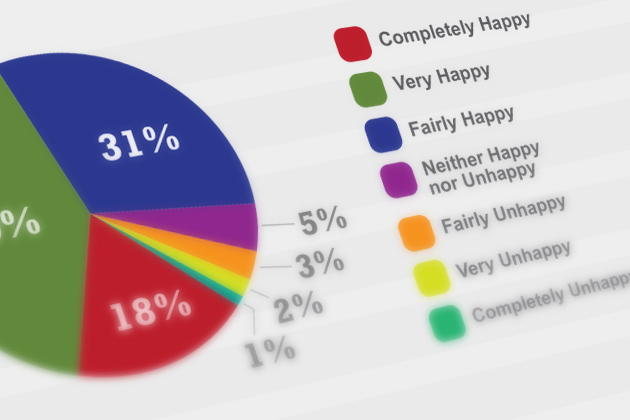
Source: The University of Connecticut/Hartford Courant survey of 1,006 randomly selected adults nationwide, June 4-June 11, 2013.
While very few Americans say that money is the most important factor in determining whether they’re happy in life, the more they earn the happier they are, according to a new University of Connecticut/Hartford Courant Poll.
The survey provides an in-depth look at how Americans feel about their lives, gauging happiness by everything from specific qualities of jobs to how often people exercise.

Source: The University of Connecticut/Hartford Courant survey of 1,006 randomly selected adults nationwide, June 4-June 11, 2013.
Overall, most Americans say intangible qualities are key to their happiness, with 50 percent identifying closeness to family as the most important factor and 21 percent saying it’s good health. Just 3 percent identify a lot of money as the top factor, and only 8 percent say it’s a rewarding career.
At the same time, 71 percent of Americans earning $100,000 a year or more report feeling either completely happy or very happy with their lives, compared to 60 percent of those making between $60,000 and $100,000 annually, and 49 percent of people earning under $60,000.
Other factors tied to personal wealth relate to the likelihood of being happy, the survey found: 68 percent of homeowners report feeling happy, compared to 47 percent of renters. And 58 percent of people with jobs say they’re happy, compared to 47 percent of unemployed people.
Overall, 58 percent of Americans say they’re either completely happy or very happy, but that seeming bliss has some complications. Forty-two percent say they frequently experience stress in their daily lives, and 62 percent say they’d be happier if their household incomes were to double.

Source: The University of Connecticut/Hartford Courant survey of 1,006 randomly selected adults nationwide, June 4-June 11, 2013.
“We’ve all heard some variation of the phrase ‘money can’t buy happiness,’ and while people are reluctant to say it’s the most important thing in life, it clearly plays a role,” UConn Poll Director Jennifer Necci Dineen said. “Money can also factor into some of these other areas, like quality of health and housing, which contribute to overall happiness.”
In addition to the broader measures of happiness, the UConn/Courant Poll discovered fine-grained detail about specific aspects of Americans’ lives, including:
- A set of questions in which Americans rate from 0 to 10 the importance of various factors in determining their happiness: relationships with family and spouses or partners rank as the most important;
- The frequency with which people perform activities related to happiness: the happiest people are more likely to exercise and pray daily, and to donate time, goods, or money, among other factors;
- Aspects of work that may play a role in happiness: the survey found that majorities of Americans with jobs are not only happy with their pay, but with factors like the degree of independence they have and the intellectual challenge of their work.
For a complete set of questions and tabulations, visit http://poll.uconn.edu.
These findings are based on The University of Connecticut/Hartford Courant Poll. The national sample of 1,006 randomly selected adults were interviewed by landline and cellular telephone between June 4 and June 11, 2013. The margin of sampling error for the survey is +/- 3 percentage points for the entire sample, and larger for subgroups.
The data have been weighted by the number of adults in a household and the number of telephone numbers, land and cellular, at which adults in the household can be reached in order to equalize the chances of an individual adult being selected. The data have also been weighted by the sex, race and level of education of the respondent based on the American Community Survey conducted by the U.S. Census.



